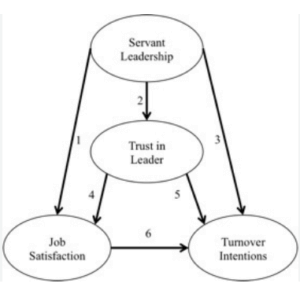Since its introduction, servant leadership as a concept has been growing in its popularity. Many organizations believe that servant leadership has a significant and direct impact on the company’s success and performance.
While most organizations recognize the value of having strong leadership at every level of an organization, businesses still struggle to find and develop leaders.
Servant leadership was introduced as a wake-up call for leaders to switch their focus from the company to the employee and provide everything in their power to enable people for success.
Such leaders are more likely to be surrounded by skilled, talented, knowledgeable, engaged, and motivated employees. In their turn, these employees are more likely to improve the overall operations and management of the organization.
In this blog, we will define servant leadership and talk about its benefits for the overall success of an organization.
💡Before we move forward, also learn about the importnace of transformational leadership in the workplace.
About Servant Leadership
The phrase “servant leadership” was introduced by Robert K. Greenleaf when he used it for the first time in his essay published in 1970. In his essay, Greenleaf explains the term servant leader and talks about the reason for its creation and the importance of a new leadership approach.
Since then, this leadership style has gained much attention and immense popularity in the world. It has been adopted by various top-ranking and world’s best-performing companies. This is not surprising as research shows that leaders and managers are accountable for 70% of the variance in employee engagement.

One of the most popular and widely-used examples of such a business model is Google. Google is a company that heavily invests in improving employee experience in the workplace, and their employee-friendly policies have remarkably increased productivity and revenue.
Traditional vs. Servant Leadership
So how is servant leadership different than traditional leadership? Because these leadership techniques are quite different, they also require different leadership skills and traits.
As mentioned earlier, the main difference is the focus on the company vs. the focus on people. In other words, traditional leaders encourage people to do their jobs by providing them with guidance, direction, and motivation. The main goal here is to improve the business position of the company or the organization in the market.
On the other hand, servant leadership occurs when the leader’s main goal and responsibility is to provide service to their people. The leader ensures that his or her followers are growing and developing in all areas — their profession, knowledge, autonomy, and even their mental health and physical development.
💡Also, learn about the difference between leadership and management.
Top 6 Traits of a Servant Leader
Now that we have defined servant leadership, let’s take a look at the most important traits of servant leaders.
1. Leading by example
The most important trait of every servant leader is to lead by example. Everything that they do needs to be a reflection of what they want to see more of among their team. Servant leaders need to be able to always demonstrate the values and behaviors that they want to see in others and have the confidence to stand up to people when they don’t act in alignment with the core company values.
When they spot these discrepancies they need to know how to provide honest and constructive feedback.
2. Frequent communication and conceptualization
71% of employees believe that their leaders do not spend enough time communicating goals and plans.

Yet, proper workplace communication can make or break a company’s success. This is particularly true now when many employees work remotely or hybridly and depend on asynchronous communication.
Leadership communication is crucial here, and servant leaders are the ones who understand the importance of open team communication.
Furthermore, servant leadership is about conceptualizing the company’s mission and vision in a way that inspires and motivates people. They need to be able to transfer their passion and motivation to their teams and make them feel proud about their work.
3. Active listening
Roughly half of employees aren’t regularly speaking their minds at work. Only 52% of employees say that they always or almost always speak their minds when having work-related conversations with their leaders.
Leaders and managers who know how to listen and are ready to accept bottom-up feedback are much more likely to build successful teams.
Asking employees for feedback frequently is crucial for understanding their needs, perceptions, opinions, ideas, and concerns. Having such insights is extremely valuable in preventing negative feelings that result in low productivity and high employee turnover.
This is why we see many companies and leaders sending regular employee pulse surveys. This is the fastest and most efficient way to quickly get valuable insights into the current state of your organization, team, or individual.
💡 Related: 16 Experts Share Their Favorite Employee Engagement Survey Questions
4. Adaptability and flexibility
Servant leadership is about adapting to the follower’s needs and expectations. Of course, this is not always possible, but being empathetic and understading the other side is crucial.
Remember, servant leadership is all about people and their happiness. The more satisfied people are, the more motivated they will be to achieve great results.
5. Employee empowerment and recognition
Servant leaders don’t micromanage. The main goal is to bring the best out of their people and empower them to make their own decisions, implement new ideas, fail, and learn.
They don’t ever consider themselves as the smartest ones in the room. Instead, they recognize other people’s skills, experiences, and expertise, and they know how to make people the best versions of themselves.
Furthermore, these leaders recognize the importance of appreciation and gratitude. They encourage acts of gratitude among their teams and company-wide. When people feel appreciated, they are more motivated and less likely to leave. According to research, 79% of employees will quit due to a lack of appreciation.

6. Care for growth and development
Servant leadership is about the commitment to the people’s personal and professional growth and development.
Professional growth and development are actually some of the biggest reasons why people leave their organizations. Servant leaders have the urge and ability to understand their team’s ambitions and career goals.
💡 Related: 14 Hacks to Stop Employees From Leaving
The Biggest Benefits of Servant Leadership In the Workplace
Leaders and their relationships with employees are the biggest shapers of employee experience in the workplace. Good salary, flexibility, health insurance, and other benefits can never compensate for poor relationships with direct managers.
So what are the main benefits of servant leadership in the workplace?
1. Improved employee experience, morale, and well-being
Building a positive employee experience is the main priority for employers across the globe. During this era of great resignation, many companies are facing very high turnover rates, and they are trying to figure out how to prevent their employees from leaving and boost their morale and motivation.
Leaders play the most important role in shaping positive experiences and ensuring good employee wellbeing. Servant leaders understand the drivers of positive experiences and they focus on those that impact their employees’ motivation and productivity.
2. Increased employee motivation and productivity
Satisfaction, motivation, engagement, and productivity are the outcomes that come from positive or negative experiences. Hence, the leader’s ability to shape positive experiences has a direct impact on employees’ engagement at work.
Servant leaders who spend more time providing frequent feedback and recognition are guaranteed to have happier teams who also have a bigger drive to be successful and achieve great results.
3. Healthier organizational culture and better team collaboration
Many CEOs consider company culture as the most important competitive advantage a company can have. According to research by Deloitte, 82% of people believe that culture is a potential competitive advantage, and 94% of entrepreneurs and 88% of job seekers say that healthy work culture is vital for success.

Servant leadership is also about building an enjoyable workplace culture where people can strive. They encourage open communication that also significantly improves team and cross-functional collaboration. Today, this collaboration is extremely important as it eliminates organizational silos common in remote companies.
4. More engaged communities
Servant leaders know how to build a sense of community within their organizations.
To achieve this, it is important to provide opportunities for people to interact with one another across the company.
Sometimes, however, people don’t have access to the right technology to easily communicate with one another. This is particularly true among frontline employees who don’t have designated working space. Even when that is the case, organizations need to provide them a way to feel like a part of the organization and join daily company conversations.
5. Employee advocacy
Great leaders are often rewarded with what’s called employee advocacy. Having employees as brand ambassadors is extremely valuable, and employee-manager relationships can have a significant impact on this.
According to Entrepreneur, social media content shared by employees gets 8 times more engagement than content shared through the brand’s own social channels and is shared 25 times more frequently.
Successful leaders are the ones who help their people live the company’s missions and vision, and these people are more likely to showcase their company’s products, offerings, and services with their own networks.
Acting as brand ambassadors, they can also impact the company’s employer brand and the ability to attract new people to the organization.
6. Improved workplace trust
Servant leaders are much more likely to gain trust from their employees.
Unfortunately, Edelman “Trust Barometer” (a survey of 33,000 people in 28 countries) says that one in three people doesn’t trust their employer. But those employers that encourage servant leadership are better at building trust in the workplace and shaping a positive organiational culture.
One research also proved that employees who trust their servant leaders are more likely to be satisfied with their jobs and stay loyal to their employers.
Enabling Servant Leaders With the Right Technology
Same as every other employee, leaders have to have access to the rightworkplace technology in order to be successful and lead their teams properly.
Today, however, we are seeing so many different employee engagement and employee experience apps on the market. Oftentimes, it is not easy to choose the right solution for your organization.
Haiilo is an employee experience platform that enables seamless communication in the workplace, it connects teams and individuals, and makes people more productive by putting the most important and relevant company information at their fingertips.
It drives better digital collaboration by integrating with other technologies used in the company.
Haiilo enables leaders to have a more personalized approach to their employees. It provides an easy way for leaders to assess their employees’ state of mind, understand their needs and concerns, and act in a timely manner.











